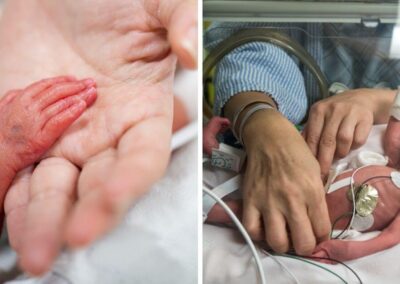A Welsh baby boy born three months prematurely and weighing just 860g has just celebrated his first birthday at home with his family.
Jade Morris, baby Rohan’s mother, was put on bed rest after her waters broke at just 23 weeks gestation. Doctors told Jade she was likely to give birth prematurely but she didn’t go into labour immediately.
“There was a lot of back and forth with appointments just to come up with a plan of action and what was going to happen”, Jade said. “I was informed I was likely to have a premature baby but hopefully not and we were going to take it day by day”.
“I was sent home and put on bed rest. I woke up one morning a few weeks later in pain and I was rushed to Singleton. The doctors decided it would be in mine and the baby’s best interests to deliver”.
Rohan was born by emergency Caesarean section
“I was quite frightened because I was very early, but the consultant talked to me and my husband throughout the procedure”.
“When he did arrive, Rohan cried, which was a shock – I wasn’t expecting that”, she added.
Rohan was born so prematurely that he had to remain in the hospital in Swansea for seven weeks before being transferred to another hospital for a further five weeks.
“The doctors didn’t think he would come along as quickly as he has. He put on weight really well”, Jade shared. “He came off the ventilator really soon. They were surprised at how well he did”.
Rohan was able to return home to join his parents and his older brother and sister. “He came home on oxygen, which was a new experience for us, but he was off that last July”, Jade said.
Rohan has just turned one and now weighs 18 pounds 6 ounces. His parents have sent a message to the neonatal intensive care unit staff thanking them for their work when Rohan was staying with them.
“He’s doing brilliantly … He’s a very happy, very smiley baby”, Jade said.
Medical advancements mean premature babies are increasingly surviving
More premature babies like Rohan are having better outcomes after treatment in hospitals. A number of key studies in recent years have documented the improving outcomes for these extremely premature babies. A 2004 Swedish study found that neonatal survival outcomes between 22 and 25 weeks gestation significantly improve when neonatal hospital staff take a proactive approach in the care of premature babies.
A 2008 study based on a neonatal intensive care unit in London also found that neonatal survival rates at 22 and 23 weeks gestation had improved. In 1981-85, no babies who were born at these gestational ages survived to discharge. However, by 1986-90, 19% did and this increased to 54% in the period 1996-2000.
A study in 2022 found almost four out of five babies born prematurely between 22 and 28 weeks gestation survive to discharge from the hospital. It found that from 2013 to 2018, with infants born between 22 and 28 weeks gestation, “survival to discharge occurred in 78.3% and was significantly improved compared with a historical rate of 76.0% among infants born in 2008-2012”.
Spokesperson for Right To Life UK, Catherine Robinson, said “It is wonderful to hear that baby Rohan is doing so well after his challenging start in life. Thankfully, increasing numbers of premature babies are able to thrive now with modern medical advancements. These babies testify to the humanity of life in the womb”.












